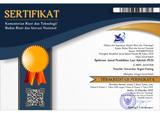Educational Alternatives to the Empowerment Process Village Community
 ), Muhamad Fahrur Rozi(2),
), Muhamad Fahrur Rozi(2), (1) Universitas Negeri Padang
(2) Universitas Negeri Padang
 Corresponding Author
Corresponding Author
DOI : https://doi.org/10.24036/spektrumpls.v10i4.122040
Full Text:
 Language : en
Language : en
Abstract
Education is regarded as the crucial strategy in human power because the mayor attention of educational institute is how to enable the learners as the output to do something based on their own capability. Unfortunately, the education has not had the ability to face this challengeing work. School education, based on its characteristics, is not appropriate for all people from various age. So, it is difficult for a school education to fulfill the expectation of preparing human power maximally, especially to improve countryside people. Developing non-formal educational system may be an right choice for it. The problem is that there are still many non-formal learning activities use the school approach which in turns, will not improve the people. The non-fomal learning activities that can improve people who involve in it, are those which can be applied in all program dimensions, that is having mini and homogenous groups, switching responsibilities, having leadership of learners, "outsiders" as facilitators, and democratization.
References
Abukari, H., & Mwalyosi, R. B. (2020). Local Communities’ Perceptions About the Impact of Protected Areas on Livelihoods and Community Development. Global Ecology and Conservation, 22, e00909. https://doi.org/10.1016/j.gecco.2020.e00909
Ahmad, S., Dhiana, P., & Warso, M. M. (2011). Pengaruh Antara Pengetahuan Kewirausahaan, Motif Berprestasi, Kemandirian Pribadi Terhadap Perilaku Kewirausahaan Pedagang Di Pasar Tegowanu. Assembly, 1, 8024.
Anggraeni, R. N., Fakhriyah, F., & Ahsin, M. N. (2021). Peran orang tua sebagai fasilitator anak dalam proses pembelajaran online di rumah. Jurnal Ilmiah Pendidikan Dasar, 8(2), 105. https://doi.org/10.30659/pendas.8.2.105-117
Ataov, A., Kahraman, Z. E. H., & Osmay, S. (2022). Empowering the Community Through Participation and Action in Historic Neighbourhood Conservation Planning. Frontiers of Architectural Research, 11(3), 492–508. https://doi.org/10.1016/j.foar.2021.12.001
Barseghyan, L., & Coate, S. (2021). Community Development by Public Wealth Accumulation. Journal of Urban Economics, 121, 103297. https://doi.org/10.1016/j.jue.2020.103297
Bergstrom, R. D. (2019). Community Development in the Face of Resource Extraction in Northern Minnesota, USA. Extractive Industries and Society, 6(3), 831–841. https://doi.org/10.1016/j.exis.2019.06.007
Dacholfany, M. I. (2018). Pemberdayaan Masyarakat Dalam Meningkatkan Mutu Pendidikan Non Formal Di Metro Lampung ( Studi Kasus Pkbm Al-Suroya ). Tapis : Jurnal Penelitian Ilmiah, Vol. 02(1), Hal.45.
Fitriana, W., & Safitri Elshap, D. (2015). Revitalisasi Peran Pendidikan Luar Sekolah dalam Pemberdayaan Masyarakat. Empowerment, 3(1), 58–66. http://www.tjyybjb.ac.cn/CN/article/downloadArticleFile.do?attachType=PDF&id=9987
Hsu, Y. C., Huang, T. H. ‘Kenneth,’ Verma, H., Mauri, A., Nourbakhsh, I., & Bozzon, A. (2022). Empowering Local Communities Using Artificial Intelligence. Patterns, 3(3), 100449. https://doi.org/10.1016/j.patter.2022.100449
Luisi, D., & Hämel, K. (2021). Community Participation and Empowerment in Primary Health Care in Emilia-Romagna: A Document Analysis Study. Health Policy, 125(2), 177–184. https://doi.org/10.1016/j.healthpol.2020.11.007
Lukman, A. I. (2021). Pemberdayaan Masyarakat melalui Pendidikan Nonformal. DIKLUS : Jurnal Pendidikan Luar Sekolah, 2(1), 180–190.
Maunah, B. (2016). Pendidikan Dalam Perspektif Struktural Konflik. CENDEKIA: Journal of Education and Teaching, 10(2), 159–168. https://doi.org/10.30957/cendekia.v9i1.53
Noor, M. (2011). Pemberdayaan Masyarakat. Jurnal Ilmiah CIVIS, 1(2), 88. https://doi.org/10.2307/257670.Poerwanto.
Prita Kartika. (2015). Optimalisasi Peran Masyarakat dalam Pemberdayaan Masyarakat Melalui Pendidikan Luar Sekolah. Empowerment, 4(1), 50–57.
Rahman, F. (2014). Pendidikan untuk Perubahan Masyarakat Bermatabat. In Seminar Nasional Fakultas Ilmu Pendidikan Universitas Negeri Yogyakarta. UNY PRESS.
Rijal, S., & Bachtiar, S. (2015). Hubungan antara Sikap, Kemandirian Belajar, dan Gaya Belajar dengan Hasil Belajar Kognitif Siswa. Jurnal Bioedukatika, 3(2), 15. https://doi.org/10.26555/bioedukatika.v3i2.4149
Risnandini, Y., & Abdullah, S. M. (2017). Kemandirian Anak Ditinjau Dari Jenis Homeschooling. Insight: Jurnal Ilmiah Psikologi, 17(1), 39. https://doi.org/10.26486/psikologi.v17i1.683
Sidabutar, S. L. M., Siburian, P., & Bintang, S. (2017). Pengaruh Budaya Organisasi, Kepuasan Kerja, dan Motivasi Berprestasi Terhadap Komitmen Organisasi Guru SMP Negeri Kecamatan Simanindo dan Kecamatan Pangururan Kabupaten Samosir. Jurnal Tabularasa PPS UNIMED, 14(3), 205–216. http://jurnal.unimed.ac.id/2012/index.php/tabularasa
Syamsi, I. (2010). Pendidikan Luar Sekolah Sebagai Pemberdaya Masyarakat. Diklus, 14(1), 66–76.
Wang, J., Huang, X., Hu, K., & Li, X. (2018). Evaluation on Community Development Programs in Mining Industry: A Case Study of Small and Medium Enterprise in China. Resources Policy, 59(April), 516–524. https://doi.org/10.1016/j.resourpol.2018.09.006
Yusuf, A. I. (2018). Kemandirian Belajar Siswa Tunadaksa Kelas Iii Sd Negeri Margormulyo Kecamatan Pengasih Kulonprogo. Basic Education, 1941–1949. https://journal.student.uny.ac.id/index.php/pgsd/article/view/11649%0Ahttps://journal.student.uny.ac.id/index.php/pgsd/article/download/11649/11196
 Article Metrics
Article Metrics
 Abstract Views : 166 times
Abstract Views : 166 times
 PDF Downloaded : 151 times
PDF Downloaded : 151 times
Refbacks
- There are currently no refbacks.

This work is licensed under a Creative Commons Attribution-NonCommercial 4.0 International License.



